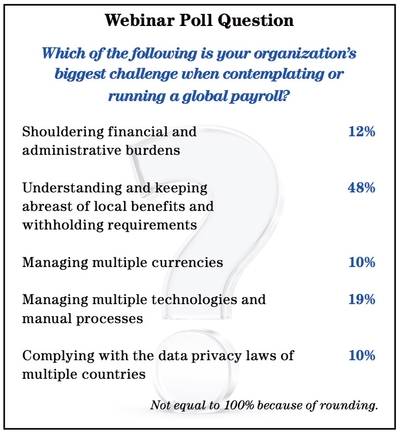When it comes to doing business in Asia, throw out what you know about complying with payroll regulations in your home country, Radius Worldwide’s Dafydd Williams said in the GPMI webinar “Overcoming Payroll Challenges in Your Asia-Based Operations.”
Williams, Senior Director of Advisory Services for Radius, talked his audience through some specific considerations for paying employees in China, Singapore, India, and even his home country of Australia.
“When establishing or maintaining operations in another country, it’s critical to understand that you must comply with the laws of that country, not U.S. laws,” he said. “What do they require you to pay and to withhold? Certainly the authorities are going to give you lots of trouble if you haven’t been withholding correctly.”
Williams laid out what payroll professionals need to know about the four countries in the categories of legal entities, expatriates, immigration, withholding and reporting, and employee benefits.
For example, Williams provided these considerations regarding employee benefits:
Australia
- Common supplementary benefits include health and life insurance.
- Superannuation (i.e., retirement) contributions are mandatory for employers, which may include payments on behalf of contractors.
- Benefits attract Fringe Benefits Tax (FBT) payable by the employer.
- Leave for sickness and care giving, vacation, holidays, maternity/paternity, and long service.
- Cars are a tool of the trade.
Singapore
- The Central Provident Fund (CPF) is Singapore’s social scheme and provides medical and retirement benefits.
- Both employees and employers make contributions. (Foreign employees who aren’t permanent residents are exempt from CPF contributions.)
- Skill Development Fund (SDF): All employers must contribute for all employees up to a certain threshold.
- Annual leave is partly based on years of service.
China
- Employers and employees must participate in the social benefits system.
- Terminations must be for “cause;” there is no at-will employment.
- Complying with statutory overtime requirements can be expensive.
- Most employers pay a 13th-month bonus, though it is
- not required.
India
- Employer social obligations vary by industry (e.g., manufacturing), and many apply only when the
 number of employees reaches a certain threshold.
number of employees reaches a certain threshold.
- Indian benefits are generally designed to protect lower-paid workers.
- The Employees’ Provident Fund (EPF) is India’s social security scheme.
- One common benefit is a Housing Rent Allowance (HRA), intended to help employees cover the cost of rent.
- Other common supplemental benefits include medical insurance, conveyance (for travel between home and office), and life insurance
“It’s not just the payroll office or manager that has to deal with these,” he said. “It’s human resources, legal counsel, tax—everybody has some kind of relationship to the foreign country employees who are being paid, and the payroll manager needs to convey that.”
GPMI Director of Instructional Design and Learning Development Nicole Smith hosted the webinar, which is available on-demand.